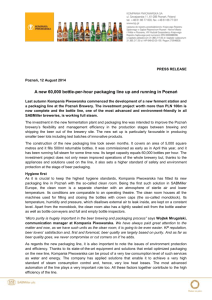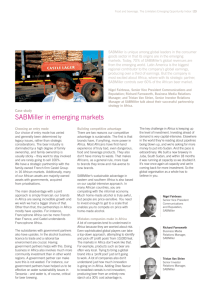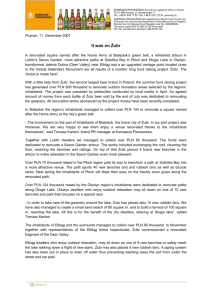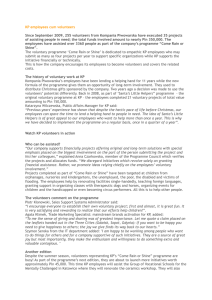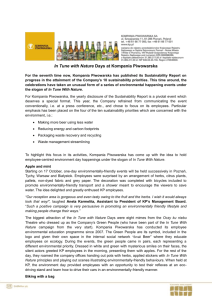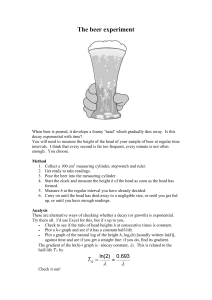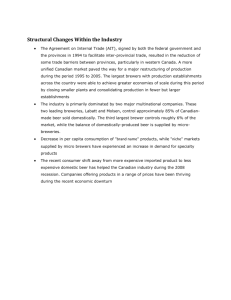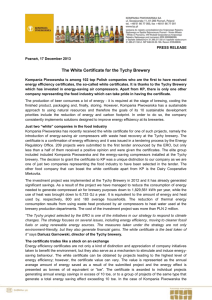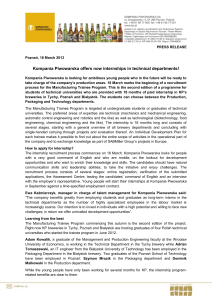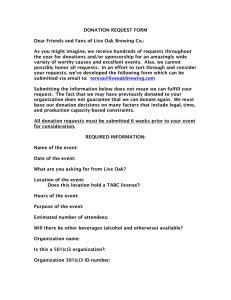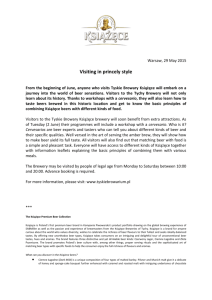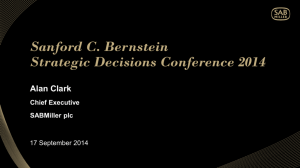- Kompania Piwowarska SA
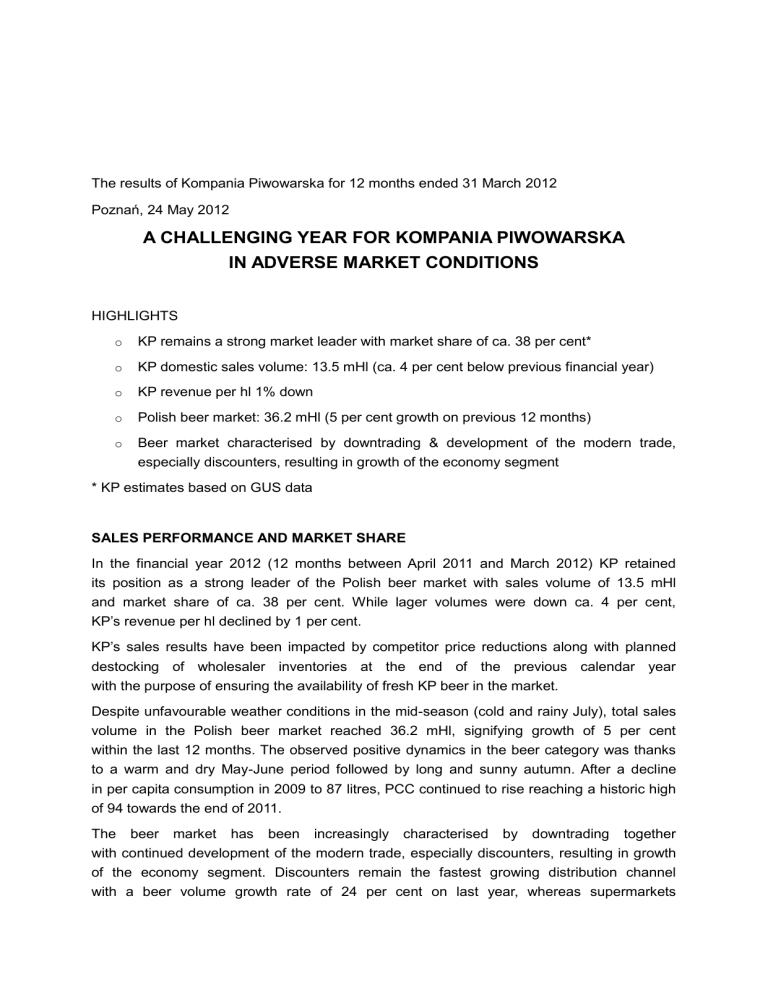
The results of Kompania Piwowarska for 12 months ended 31 March 2012
Poznań, 24 May 2012
A CHALLENGING YEAR FOR KOMPANIA PIWOWARSKA
IN ADVERSE MARKET CONDITIONS
HIGHLIGHTS o KP remains a strong market leader with market share of ca. 38 per cent* o KP domestic sales volume: 13.5 mHl (ca. 4 per cent below previous financial year) o KP revenue per hl 1% down o Polish beer market: 36.2 mHl (5 per cent growth on previous 12 months) o Beer market characterised by downtrading & development of the modern trade, especially discounters, resulting in growth of the economy segment
* KP estimates based on GUS data
SALES PERFORMANCE AND MARKET SHARE
In the financial year 2012 (12 months between April 2011 and March 2012) KP retained its position as a strong leader of the Polish beer market with sales volume of 13.5 mHl and market share of ca. 38 per cent. While lager volumes were down ca. 4 per cent,
KP’s revenue per hl declined by 1 per cent.
KP’s sales results have been impacted by competitor price reductions along with planned destocking of wholesaler inventories at the end of the previous calendar year with the purpose of ensuring the availability of fresh KP beer in the market.
Despite unfavourable weather conditions in the mid-season (cold and rainy July), total sales volume in the Polish beer market reached 36.2 mHl, signifying growth of 5 per cent within the last 12 months. The observed positive dynamics in the beer category was thanks to a warm and dry May-June period followed by long and sunny autumn. After a decline in per capita consumption in 2009 to 87 litres, PCC continued to rise reaching a historic high of 94 towards the end of 2011.
The beer market has been increasingly characterised by downtrading together with continued development of the modern trade, especially discounters, resulting in growth of the economy segment. Discounters remain the fastest growing distribution channel with a beer volume growth rate of 24 per cent on last year, whereas supermarkets
have grown at 6 per cent. Traditional trade is still the biggest channel although it continues its decline.
COMMENTS FROM ROB PRIDAY, THE PRESIDENT OF THE MANAGEMENT BOARD:
- It’s been a tough period for Kompania Piwowarska. There has been a reduction of prices which has led to a significant growth of the economy segment where we are underrepresented versus our competitors. As a result of the significant growth of the modern trade, led by discounters, the situation in traditional trade has been tough. We need to compete but we are not going to do this by cutting prices and destroying the category by commoditizing beer. We have been planning carefully our recuperation and recently started executing these plans and pleasingly we can see the results already. New products, packaging innovations, great marketing campaigns hopefully reflect our intention in the market and are what our consumers can expect from us. We are intent on communicating the value of great beer and how our quality brands deliver against every consumer occasion. Hopefully we will continue to surprise our Polish compatriots with outstanding offerings and thereby reignite a true Polish beer culture.
KP BRAND PERFORMANCE AND INNOVATIONS
In this environment KP’s economy brand Wojak has performed well and gained market share however key mainstream brands and the premium segment have been negatively affected.
Meanwhile the past year saw intensified marketing and promotional activities of KP’s key brands as well as innovation both within the area of products and packaging.
In the financial year F12 ended on 31 March, in line with the strategy that entails the launching of innovations on our beer market aimed to model a product offer and make it optimal for the ever growing and continuously changing consumer needs seeking new taste experiences, KP launched and marketed 3 new products. Last year in mid-September Zubr
Ciemnozloty appeared on the Polish market; it was an autumn and winter extension of the second biggest Polish brand by volume and popularity. Zubr Ciemnozloty was a beer with a richer taste and darker colour, with higher extract, in which consumers could find warm flavours of caramel and toffee supplemented with fresh taste of pale barley malt with distinct but unobtrusive hop bitterness.
Kompania Piwowarska has also launched two more product during the year, namely a classic weizen – Ksiazece Pszeniczne, and a Redd’s with a new taste – Redd’s Cranberry, also launched as a limited edition. The two other, top KP brands, Tyskie and Lech, conducted intensive marketing and trade activities based on new, refreshed creative platforms.
Commenting on KP brand performance Rob Priday said:
- We are not happy though and our innovations continue, we have already doubled the F12 innovations in the first 2 months of this year and there is more to come. We are also focused
on continually renovating our key brands as can be seen with the new Lech bottle and the recent increase in market activity for Tyskie.
KP # 2 RESPONSIBLE BUSINESS AMONG ‘CONSUMER GOODS’ COMPANIES
During the last year Kompania Piwowarska has continued to provide evidence of its highest standards in corporate social responsibility. For the sixth time in its history KP has been awarded in the prestigious ranking of Responsible Companies, as it won a high third place in the contest run under the auspices of the Responsible Business Forum. In addition, KP was placed second in the ranking of the Responsible Business Industry Leader, in the category of "Consumer goods", which confirms its commitment to corporate social responsibility. At the same time, the weekly magazine POLITYKA released its first own ranking of socially responsible companies. In this elite group was also Kompania
Piwowarska, thus becoming the winner of the prestigious POLITYKA Golden Leaf award.
SABMILLER PLC F12 FINANCIAL RESULTS
Today SABMiller plc – mother company of KP – also announces its results for the period of 12 months ended 31 March 2012. The group delivered a strong financial performance.
Group revenue grew by 11% (7% on an organic, constant currency basis) as a result of the higher volumes, selective price increases and higher growth in premium brands. Total beverage volumes of 286 million hl were 4% ahead of the prior year on an organic basis, with lager volumes up 3%, soft drinks volumes up 7% and other alcoholic beverages up 4%.
Successful development of our brand portfolios and intensified sales execution, together with rising consumer spending drove strong performance in most of our developing markets.
Latin America and Africa were particularly notable, while South Africa and the Asia Pacific region also generated significant, profitable growth. Despite strong results in a number of its markets, Europe’s financial performance was affected by volume declines in Poland and Romania and significant increases in raw material input costs.
EBITA increased by 12% on a reported basis (8% on an organic, constant currency basis), with all beverage divisions except for Europe contributing to EBITA growth. EBITA margin was 10 bps ahead of the prior year at 17.9%. Group revenue growth (up 4% on an organic, constant currency per hl basis) offset increases in raw material costs (up low single digits on a constant currency per hl basis). Marketing investment rose in line with revenue, while fixed costs increased as a result of expenditure on sales and systems capabilities across our operations and in the corporate centre.
Meyer Kahn, Chairman of SABMiller, said:
“‘I am delighted to report another year of significant progress and strong results. Through our successful marketing, portfolio development and commercial execution we continued to build on our position in the world’s developing consumer economies. Strong profit growth continued, driven by an organic total volume increase of 4% and complemented
by favourable mix and pricing. We continued to expand our global footprint with the acquisition of Foster’s, the merger of our Russian and Ukrainian businesses with Anadolu Efes in exchange for a stake in the enlarged business, and the further develop ment of our alliance with Castel.”
On 16 December 2011 the group completed the acquisition of Foster’s Group Limited
(Foster’s) in Australia. The acquisition provides us with exposure to Australia’s strong economic growth prospects, a leading position in the stable and profitable Australian beer industry, and the opportunity to apply our capabilities and scale to improve Foster’s financial and operating performance. The integration of the Foster’s business has progressed very well to date despite the loss of some brand licences, which was a known risk at the time of acquisition. With effect from 1 January 2012, together with Castel we implemented a number of organisational changes in our African operations as part of our strategic alliance agreement. Operational management of the Nigerian businesses is now with SABMiller and the Angolan businesses with Castel. On 6 March 2012 we completed our strategic alliance with Anadolu Group and Anadolu Efes Biracilik ve Malt Sanayii AS (Anadolu Efes), exchanging our Russia and Ukraine beer businesses for a 24% equity stake in the enlarged
Anadolu Efes group. Anadolu Efes is now the vehicle for both groups’ investments in Turkey,
Russia, the CIS, Central Asia and the Middle East.
SABMILLER EUROPE PERFORMANCE
In Europe, full year lager volumes declined by 1% on both a reported and an organic basis.
Apart from Poland, volumes dropped in Romania, although other markets generally saw improved volume trends. Beer markets continued to be affected by consumer downtrading and industry focus on economy brands and packs, together with growth in modern trade and discounter channels, and declining on-premise channels.
Reported EBITA declined by 6% while profitability across the region was impacted by significant increases in ra w material costs and negative brand mix. Overall Europe’s group revenue per hl grew 1% on both a reported and an organic, constant currency basis, reflecting selective price increases and against a backdrop of structural shifts to the economy segment and the modern trade channel in certain markets. Operational cost efficiencies including those from our global procurement and regional manufacturing projects continued to deliver benefits. Marketing expenditure was marginally below the prior year which included the 2010 FIFA World Cup activations. On an organic, constant currency basis EBITA was down 9% with a margin decline of 160 bps.
Note to the editors:
Kompania Piwowarska - leader of the Polish beer industry
Kompania Piwowarska is the largest brewer in Poland. Hundreds of years of experience in brewing, state-of-theart technology and rigorous adherence to ‘world class manufacturing’ guarantee highest quality beer. The company's brand portfolio includes bestselling Polish beers: Tyskie, Żubr, Lech, Dębowe Mocne, Redd's as well
as international premium brands: Pilsner Urquell, Grolsch and Peroni Nastro Azzurro. Kompania Piwowarska, established in 1999, operates three breweries (in Tychy, Poznań and Białystok) and depots across the country.
Kompania Piwowarska is engaged in a number of social programs, addressing poverty- based social exclusion as well as educational programs promoting responsible and moderate drinking. In the fiscal year on 31 March 2011,
KP sales volume amounted to 14.1 mill hectolitres.
SABMiller – one of the largest brewers in the world
Kompania Piwowarska is part of SABMiller plc, one of the world's largest brewers with brewing interests or distribution agreements across six continents. The group's international portfolio of brands includes premium international beers such as Grolsch, Miller Genuine Draft, Peroni Nastro Azzurro and Pilsner Urquell, as well as market-leading local brands such as Aquila, Castle, Miller Lite, Snow and Tyskie. SABMiller is also one of the largest Coca Cola bottlers outside the US. In the year ended on 31 March 2011, the group reported US$ 5.0 billion in profit (EBITA) and group revenue of US$ 28.3 billion. SABMiller plc is listed on the London and
Johannesburg stock exchanges.
Enquiries:
Wojciech Mrugalski
Paweł Kwiatkowski communications manager corporate affairs director wojciech.mrugalski@kp.sabmiller.com
pawel.kwiatkowski@kp.sabmiller.com
landline + 48 61 667 7667 mobile + 48 601 91 11 44 fax + 48 61 667 7850 landline + 48 61 667 7881 mobile + 48 601 599 198 fax + 48 61 667 7850
